The song “Lili Marlene” was not originally written by Marlene Dietrich. The song was written by a German soldier named Hans Leip, during The First World War. Leip, wrote the song for his two girlfriends Lili and Marlene. Lili Marlene was published in 1937 and recoded in August 1939 by cabaret artist Lale Anderson. The song first came over the air during WWII on August 18, 1941, where it would became a huge hit among the British and German forces. The song was translated in English and German.
German Lyrics
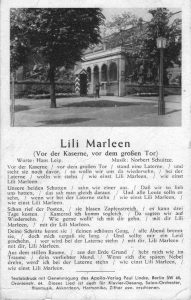
Eventually, Marlene Dietrich would later come to sing the song “Lili Marlene”. Dietrich was born in Germany on December 27, 1901, she was a singer and actress. Her acting career would eventually take off and she would soon become a famous actress within the United States. She would eventually become a Unites States citizen and support the war efforts against the Nazi regime in Germany. Although, she did not write the song “Lili Marlene” it would become one of the songs she sang throughout her career. Known for her sex appeal and the apparel she choose to wear, her life as a singer and “femme fatale” were interconnected to the support of military troops and WWII. Although, Marlene Dietrich is known for singing the song she was not the only person to sing the hit. Suzy Solidor who sang the song in French and Vera Lynn were also known for singing “Lili Marlene”.
Images of Marlene Dietrich
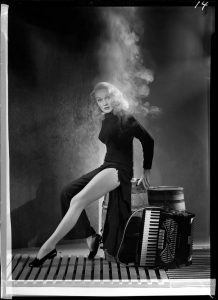
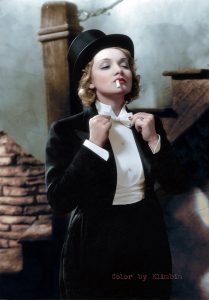
The song would have been a hit as it reminds the troops of the women in their lives.The nostalgia behind being in a foreign country and waiting/wanting to be in the arms of a woman would have made many seek the comfort of a woman. Thus, the song is poetic, which also allows you into the mind of the German soldier Lieb. The lyrics are as follows:
“Outside the barracks, by the corner light
I’ll always stand and wait for you at night
We will create a world for two
I’ll wait for you the whole night through
For you, Lili Marlene
For you, Lili Marlene
Bugler tonight don’t play the call to arms
I want another evening with her charms
Then we will say goodbye and part
I’ll always keep you in my heart
With me, Lili Marlene
With me, Lili Marlene
Give me a rose to show how much you care
Tie to the stem a lock of golden hair
Surely tomorrow, you’ll feel blue
But then will come a love that’s new
For you, Lili Marlene
For you, Lili Marlene
When we are marching in the mud and cold
And when my pack seems more than I can hold
My love for you renews my might
I’m warm again, my pack is light
It’s you, Lili Marlene
It’s you, Lili Marlene
My love for you renews my might
I’m warm again, my pack is light
It’s you, Lili Marlene
It’s you, Lili Marlene”
The song elicits the cold hard truth that many soldiers may only have a night to be in the arms of a woman, and even something as simple as, a “lock of hair” gives them hope for a better tomorrow. The song reminds not only the men but the women involved with the military, that though it may be a hard and a quick love, the memory the two of them share together for one night will be remembered forever. Thus, giving each other strength to go on the next day.
Here is a video of Marlene Dietrich singing “Lili Marlene”:
https://www.youtube.com/watch?v=qR-nGIJAaw4
The tone of the song is sad yet hopeful. Its slow melody promotes the opportunity for soldiers to slow dance with that one woman till the beat starts to pick up allowing both to do a quick little jig before reverting back to its slow rhythm. I think the music is attempting to remind whoever is listening that yes, we have tonight but tomorrow may well be the last night they have with each other, so why not make the best of the opportunity. I imagine the song would have been played in Pubs and concerts throughout the country.
Songs such as “Lili Marlene” would have given hope to the troops and having “eye candy” to look at while on tour would have promoted hope amongst the troops. We can thank woman like Marlene Dietrich for raising and helping keep morale alive for the troops serving during WWII, as their lives were literally at stake. I believe that both Britain and Germany have a lasting memory of “Lili Marlene”. After all, men and women are still volunteering and signing up with the military today, and I am certain their is someone in their heart who they hope to have in their arms (even if its such for a night) .
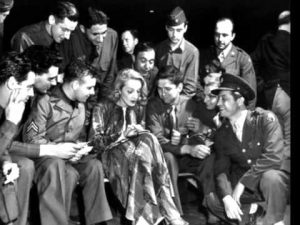
Works Cited:
http://www.iwm.org.uk/history/the-song-that-ruled-the-airwaves-during-the-second-world-war
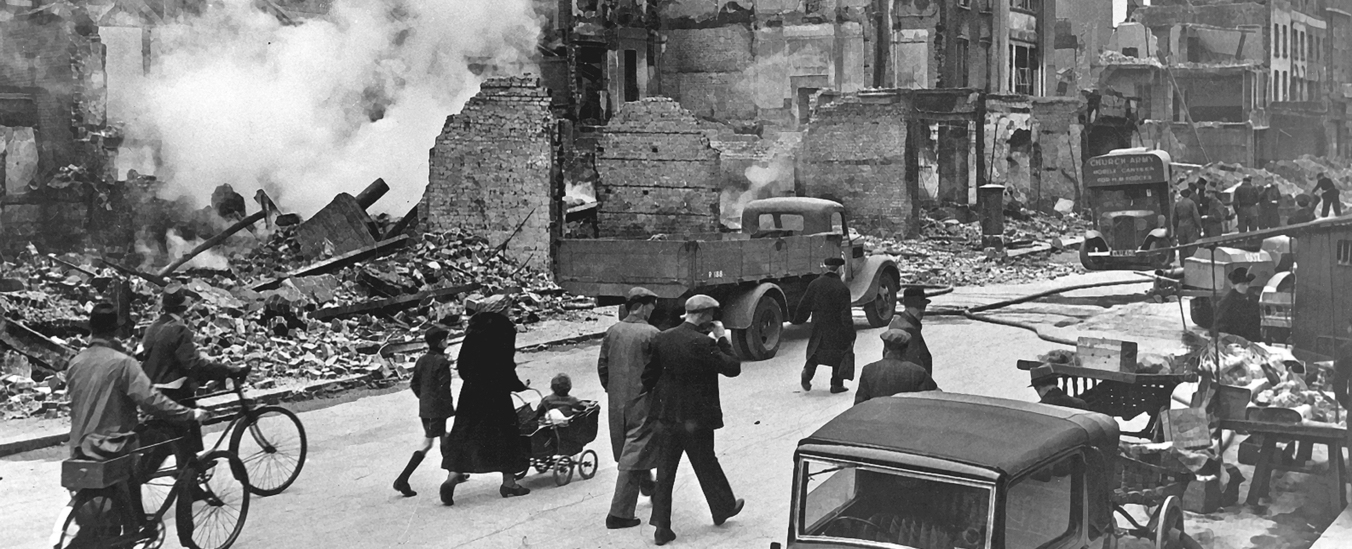



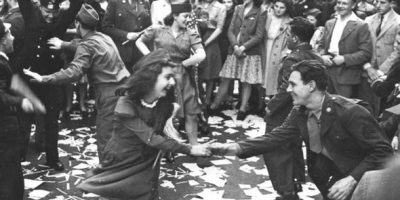


Melissa Dinsman
This is an interesting post and you do a nice job of reading the lyrics here. The sound of the song is so quintessentially German cabaret that it is somewhat surprising that it became such a hit during the war. In your research, did you get a sense of why this German song was picked up to boost the morale of Allied soldiers? Also, did you get any sense as to why Dietrich’s version became so popular? What was it about her that enabled this song to be connected to her?
Isamar Perez Santiago
I think, despite its being a German cabaret, the song became such a hit among Allied soldiers because its relatable, it speaks to the soul and heart; a human characteristic. These men and women are serving in the military and it does not matter which side they are fighting for, German or British. After all, many are there because they have to serve, not because they believe in the war. It was in 1914, on Christmas Day during the First World War, that soldiers dropped their arms to celebrate together; German, British and the French all united. I did get a sense as to why Dietrich’s version of the song became so popular and I believe I read it was because of her unique voice, and certainly because of her sex appeal. She was described as sultry and seductive. A “Femme Fatale” in her own right. She even maintained a secluded and private lifestyle to add on to the mysterious image she portrayed. I also think that the fact she is German and became an American helped her image. Her choice in style also made her alluring as she mixed masculine qualities (in her clothing) with feminine aspects. Making her different and coquettish. Also, she did become an officer in the military, which would have enhanced her renown amongst soldiers and the military in general.